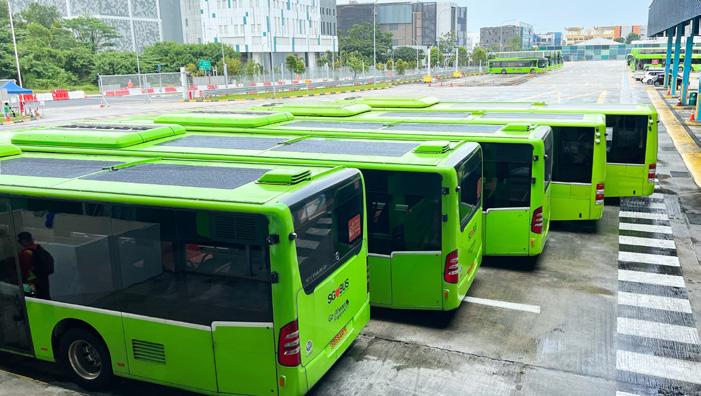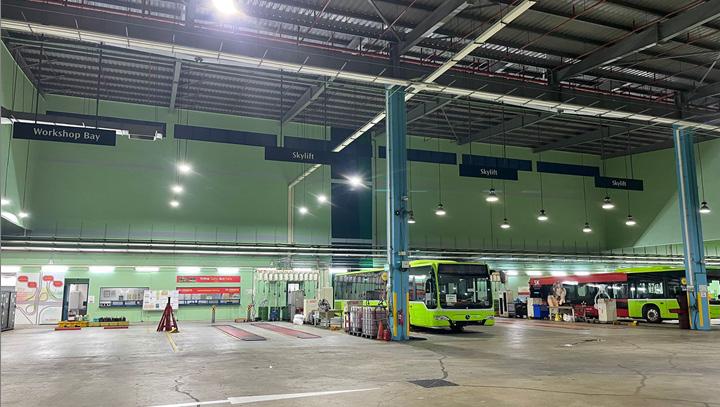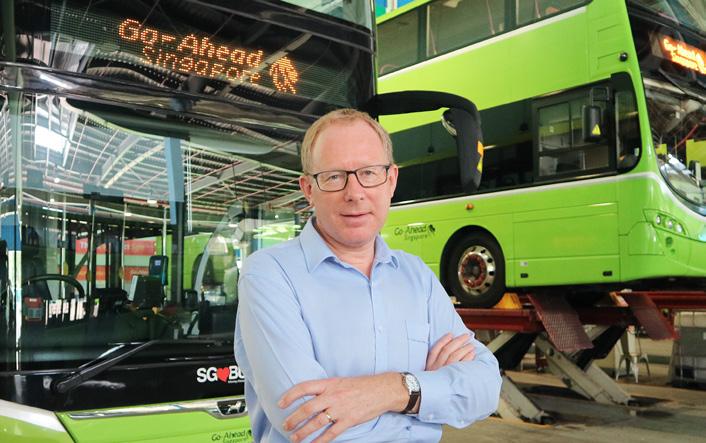
3 minute read
Environmental impact
In 2021, Go-Ahead Group launched its Climate Change Strategy and set a goal to become a net-zero business by 2045. Go-Ahead Singapore is fully committed to our Group’s Strategy and developed an action plan detailing how we will support Go-Ahead in achieving its climate targets.
Managing and reducing the impact we have on the environment is vital to the sustainability of our business. Through the Climate Change Strategy, we focus on five environmental priorities: Climate change adaptation, decarbonisation, air quality, water, and waste. For each one of these topics, we have a set of initiatives to support our Group targets which are detailed in the following pages – as well as our progress in the reported year.
Advertisement
Here at Go-Ahead Singapore, our strategy focuses on decarbonisation and air quality as we continue to reduce emissions from our fleet in close collaboration with the LTA. The more our low emission fleet is used to reduce car-based trips, the better for the climate and health of the Singapore population. Our strategy highlights include:
Climate change adaptation: developing a climate change risk registry and managing related risks
Decarbonisation: raising efforts towards decarbonising of our premises, ancillary fleet, and bus fleet
Air quality: implementing innovative projects and improving air quality measurement
Waste: enhancing waste management methods
Water: developing water efficiencies, usage reporting and measurement tactics
Climate change adaptation
We are all increasingly feeling the impacts of climate change. Monitoring how climaterelated events and regulations affects our business is a continuous activity. Here at Go-Ahead Singapore, we have already experienced warmer weather, heavier rainstorms, and more pronounced dry spells. This affects road conditions and impacts our bus captains and commuters.
We have started to develop our adaptation risk register. The top strategic and operations risks and their related potential associated costs are being prioritised and will be the foundation for an action plan.
To continue tracking impacts we are leveraging our existing incidence report process to flag weather-related events. We will revise these data on a regular basis to improve our risk and opportunities register. The risk and climate change impact will be included in all key management processes and decisions.
Decarbonisation and air quality
Public transport is a vital part of the solution to reduce carbon and air emissions in the transport sector. Our Group's decarbonisation strategy focuses on two pillars: the modal shift from private cars to public transport, and decarbonisation of our fleet. With that in mind, the Group is committed to transitioning to a 100% zero-emission fleet in the UK by 2035. In Singapore, we are committed to supporting the LTA in clean energy bus trials and sharing with them our experience operating electric buses overseas. In 2016, we operated Singapore's first electric public bus.
Roll out of 50 additional buses fitted with ultra-thin solar panels
Following a successful proof-of-concept pilot of two buses with solar panels in March 2021, Go-Ahead Singapore is fitting 50 more buses which will progressively commence passenger service from January 2023.
The pilot aimed to evaluate the buses’ performance and effectiveness to harness solar energy to reduce carbon emissions and fuel consumption under our tropical climate and traffic conditions. Findings were encouraging and we were able to achieve fuel savings of 3% to 4% a year, translating to about 4 tonnes of carbon emissions annually per bus.
By the end of April 2023, 52 buses will be fitted with roof-mounted solar panels including the two initial pilot buses. When these 52 buses are fully deployed for passenger service, their carbon emissions will be cut by approximately 200 tonnes annually, which is equivalent to the annual carbon emissions of 43 passenger cars.
Aligned with our efforts to support sustainable transportation and Go-Ahead Group’s ambition to be a net-zero carbon business by 2045, this initiative is also in step with Singapore’s Green Plan 2030 and commitment to achieving net-zero emissions by 2050.
In addition to the operational benefits, LED lights also have a positive sustainable impact on our environment. They use considerably less energy and are up to 80% more efficient than traditional lighting. By reducing electricity consumption, we lower the emissions of greenhouse gases attached to the electricity generation.
Solar panels are fitted on the roof of diesel buses
Replacement to LED light bulbs
We have replaced the light bulbs at our depot and interchanges with energy-efficient LED lighting. Sustainable lighting provides a more conducive and healthier work environment, as studies have suggested that optimal lighting at the workplace pays dividends in terms of improved productivity and a reduction in errors.

Temperature of air conditioners
The air conditioning system at our premises are serviced and maintained by professionals regularly to ensure its proper function. Its temperature is also set at a consistent 23 to 25 degrees Celsius throughout the offices for better energy efficiency. Furthermore, a timer is pre-set for the air conditioners to switch off during non-operational hours.
Water
Water is a vital resource to our business and its availability is increasingly threatened by the impacts of Climate Change. We are focused on decreasing our consumption and contributing to our Group’s target of reducing water consumption by 25% by 2025 against our performance in 2019/20.
Here at Go-Ahead Singapore, our anticipated water saving by 2025 is 10%.




